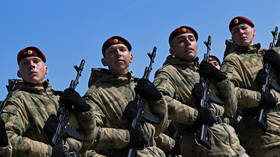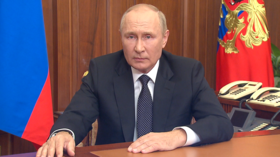US and allies react to Russia’s partial mobilization

The US and its European allies have reiterated their commitment to supporting Ukraine, in response to the announcement in Russia of a partial mobilization.
“Sham referenda and mobilization are signs of weakness, of Russian failure,” US ambassador to Ukraine Bridget Brink wrote on Twitter on Wednesday.
She insisted that Washington “will never recognize Russia’s claim to purportedly annexed Ukrainian territory,” referring to the planned votes on joining Russia to be held in Donbass, Zaporozhye and Kherson regions between September 23 and 27. In his earlier speech, Russia’s President Vladimir Putin pledged to support the referendums in terms of security and said Moscow would respect whatever outcomes they produce.
“We will continue to stand with Ukraine for as long as it takes,” Brink promised.
British ambassador to Ukraine Melinda Simmons came up with an almost identical tweet on the issue, claiming that Russia’s President Vladimir Putin “still refuses to understand Ukraine. Partial mobilization and sham referenda don’t change that essential weakness.”
One of the key members of the German government Robert Habeck, who is both vice chancellor and economy minister, described Moscow’s partial mobilization as “another bad and misguided step” by the country.
Habeck also vowed that Berlin will continue to support Kiev in its conflict with Moscow.
President Putin announced the partial mobilization earlier on Wednesday, insisting that it was a sensible and necessary move, as Russia was up against “the entire Western military machine” in Ukraine.
Those recruited would be provided additional training, along with all the benefits due to persons involved in active duty, he said.
Defense Minister Sergey Shoigu later clarified that some 300,000 reservists, or just over 1% of Russia’s full mobilization potential, are designated to be called to arms.
The US, EU, the UK and some other countries have been actively supporting Ukraine during the fighting, providing Kiev with weapons, including multiple rocket launch systems, armored vehicles and drones, as well as sharing intelligence and sending billions of dollars in financial aid to the government of Vladimir Zelensky.
Several thousand foreign mercenaries have also been involved in the conflict on Kiev’s side. Minister Shoigu said on Wednesday that more that 2,000 of them have been killed, with another 1,000 soldiers of fortune remaining in the ranks of the Ukrainian military.













